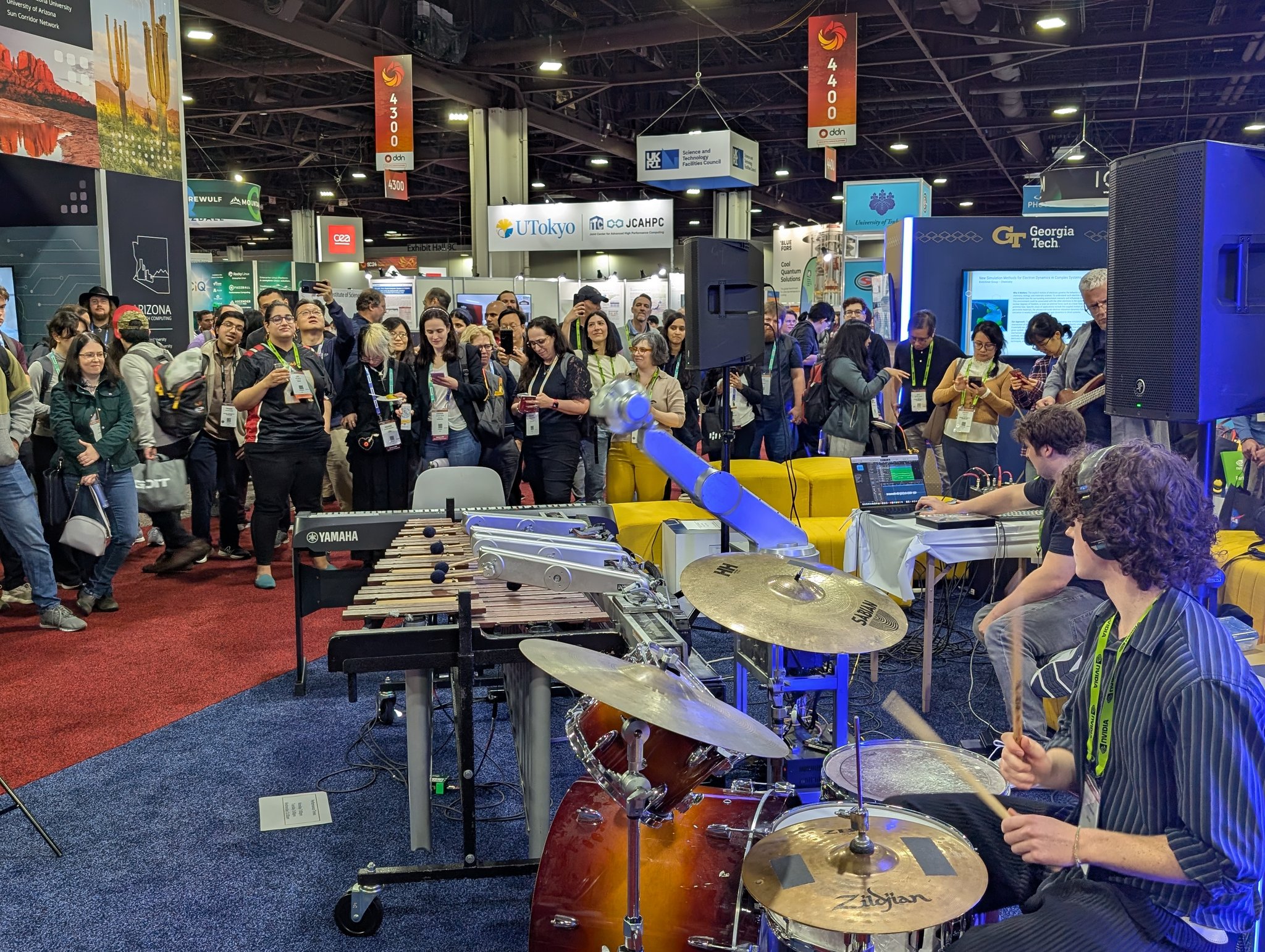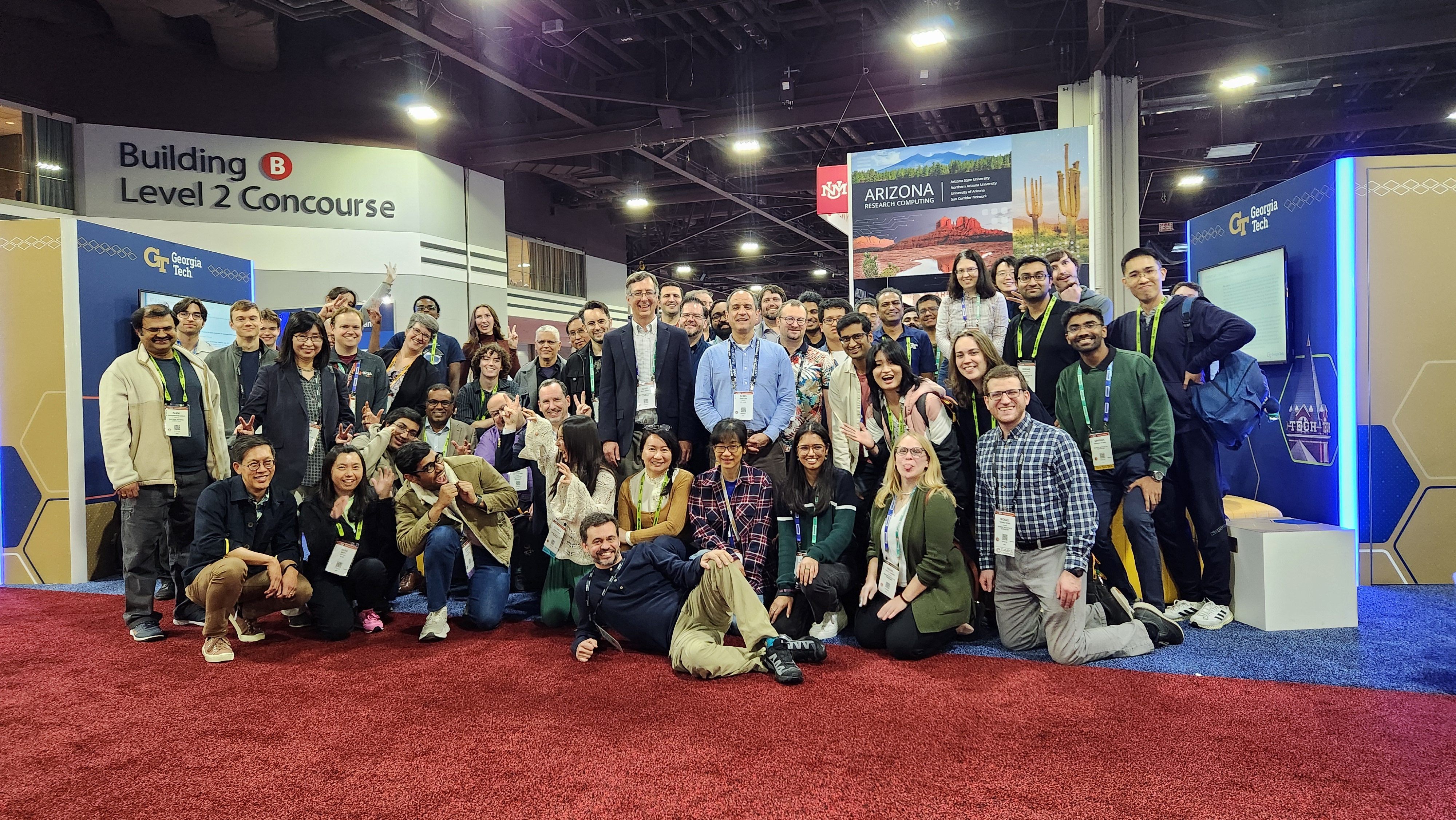SC 2024
International Conference for High Performance Computing, Networking, Storage, and Analysis | Nov. 17–22, 2024

Atlanta welcomes the International Conference for High Performance Computing, Networking, Storage, and Analysis on Nov. 17–22 at the Georgia World Congress Center. More commonly known as Supercomputing, SC 2024 will draw thousands of scientists, engineers, researchers, and industry leaders to showcase the latest advancements in supercomputing technology and its applications.
This is the first SC conference in Atlanta. The academic and industry event was established in 1988 by the Association for Computing Machinery (ACM) and the IEEE Computer Society.
Explore Georgia Tech’s contributions to the SC 2024 technical program, and discover the teams working in high-performance computing (HPC). If you’re at the conference, come say “hi” at the Georgia Tech booth, #4415!
High-performance computing (HPC) enables the processing of massive datasets and complex calculations at speeds far beyond standard computers, allowing scientists and engineers to solve intricate challenges ranging from climate modeling to artificial intelligence. Meet the Georgia Tech experts charting a path forward.
#SC2024

Georgia Tech at SC 2024
By the Numbers
Partner Organizations
AMD Research • Argonne National Laboratory (ANL) • Barcelona Supercomputing Center (BSC) • Brookhaven National Laboratory • ENS Lyon • Georgia Tech • Hewlett Packard Enterprise • IBM • Intel Corporation • Lawrence Berkeley National Laboratory (LBNL) • Lawrence Livermore National Laboratory • Massachusetts Institute of Technology (MIT) • Meta AI • MITRE • Nvidia • Oak Ridge National Laboratory (ORNL) • RIKEN Center for Computational Science (R-CCS) • RWTH Aachen University • Sandia National Laboratories • Stony Brook University • Technical University of Munich • Tokyo Institute of Technology • University College London (UCL) • University of Delaware • University of Minnesota • University of New Hampshire • University of North Carolina at Charlotte • University of Tennessee Knoxville • University of Texas Austin • University of Torino • University of Utah • University of Virginia • Zero ASIC


Georgia Tech has 50 researchers presenting at Supercomputing this year, reflecting our long-time commitment to leadership in high-performance computing. I am delighted to welcome HPC researchers from around the globe to Atlanta, and I look forward to our interactions at the conference.”
Vivek Sarkar
John P. Imlay, Jr. Dean, College of Computing at Georgia Tech
Professor, School of Computer Science
Faculty in technical program 🔗
The Big Picture 🔗

FEATURED: The Art of HPC
Undergrad Researcher Simulates Red Blood Cells Flowing Through a Microaneurysm Using High-Performance Computing

Suzan Manasreh is a 4th-year computer science major studying large-scale computer simulation with Spencer Bryngelson, assistant professor in Computational Science and Engineering.
Last summer, Manasreh worked on maintaining a large Computational Fluid Dynamics (CFD) simulator to support new types of biophysics simulations. The simulator was called RBC3D and was used to simulate blood cells flowing through vessel walls.
“The project required significant amounts of interdisciplinary knowledge across math, physics, computing, graphics, and even anatomy,” says Manasreh.
To illustrate this, she says that all the simulation objects were geometrically defined, so many parts of the algorithm were similar to computer graphics applications. Interactions between particles in the simulation used n-body methods from computational chemistry, requiring her to understand and validate each part.
“I also had to have a good knowledge of high-performance computing topics because these simulations sometimes required 100’s of CPU cores all communicating and sending data to each other to run.

“In the end, I created a simulation of red blood cells flowing through a microaneurysm because I could pull meaningful data from this simulation such as wall shear stress on the blood vessel walls to help predict rupture rates and other similar measures.”
The undergraduate researcher submitted the simulation graphics she helped visualize and ray-trace with Paraview and OSPray to SC24’s Art of HPC contest, which will be displayed at the conference at the Georgia World Congress Center.


FEATURED
New HPC Algorithm Energizes Faster, Scalable Simulations of Chemical Systems
By Bryant Wine
A first-of-its-kind algorithm developed at Georgia Tech is helping scientists study interactions between electrons. This innovation in modeling technology can lead to discoveries in physics, chemistry, materials science, and other fields.
The new algorithm is faster than existing methods while remaining highly accurate. The solver surpasses the limits of current models by demonstrating scalability across chemical system sizes ranging from large to small.
Computer scientists and engineers benefit from the algorithm’s ability to balance processor loads. This work allows researchers to tackle larger, more complex problems without the prohibitive costs associated with previous methods.

“The combination of solving large problems with high accuracy can enable density functional theory simulation to tackle new problems in science and engineering.”
Edmond Chow, Professor and Associate Chair, School of Computational Science and Engineering (CSE) at Georgia Tech

Georgia Tech @ SC24
Booth #4415
The Institute for Data Engineering and Science (IDEaS) organizes the Georgia Tech booth at Supercomputing annually.
The SC exhibit is an opportunity for institute experts and partners to meet and network together. Visitors have the opportunity to learn about Tech’s research in multiple HPC areas and innovative applications of the technology.
This year, a robotics showcase is part of the exhibit. Shimon is an improvising robotic marimba player from the lab of Gil Weinberg that is designed to create meaningful and inspiring musical interactions with humans, leading to novel musical experiences and outcomes.
Come out for daily performances of this one-of-a-kind experience!
Robot music performance:
- Monday: 7 p.m. (Open Gala)
- Tuesday: 3 p.m.
- Wednesday: 11 a.m.
Booth exhibit organizers
The Institute for Data Engineering and Science (IDEaS) manages the financial sponsorship and planning of the Georgia Tech booth exhibit each year at Supercomputing. Georgia Tech funding for this comes from a partnership between the Office of the Executive Vice President for Research, College of Computing, and Office of Information Technology.
Special thanks for the year-round project development go to:
- David Sherrill – faculty coordinator
- Carolyn Young – staff support
- Christa Ernst – communications


- Meetups 🤝
- Breaks 👟
- Swag 🎉
- Experts 💭
- Networking 💻

RESEARCHERS 🔗

See you in Atlanta!
Development: College of Computing
Project Lead/Data Graphics: Joshua Preston
Project Co-Lead: Bryant Wine
Photography: Kevin Beasley, Terence Rushin, SC gallery
Data Management: Joni Isbell























